Professional Identity and Practice in the Hospitality Sector Report
VerifiedAdded on 2021/02/20
|13
|2204
|147
Report
AI Summary
This report delves into the concept of professional identity and its practical application within the hospitality industry, using Hilton Hotel as a case study. It begins by outlining the key benefits of ongoing professional development for various stakeholders, including increased adaptability, higher salary potential, and career advancement. The report then identifies the essential skills and competencies expected by employers in the hospitality sector, emphasizing teamwork and effective communication. The author, as a prospective HR manager, assesses their own skills, abilities, and competencies, highlighting the importance of communication, time management, and problem-solving skills. The report further explores various learning approaches and theories, such as humanistic, behavioral, and social learning theories, that contribute to personal and professional development within an organization. The report concludes by summarizing the importance of professional identity and practices in the hospitality sector, emphasizing the need for continuous improvement and adaptation to enhance customer relationships and achieve organizational goals.
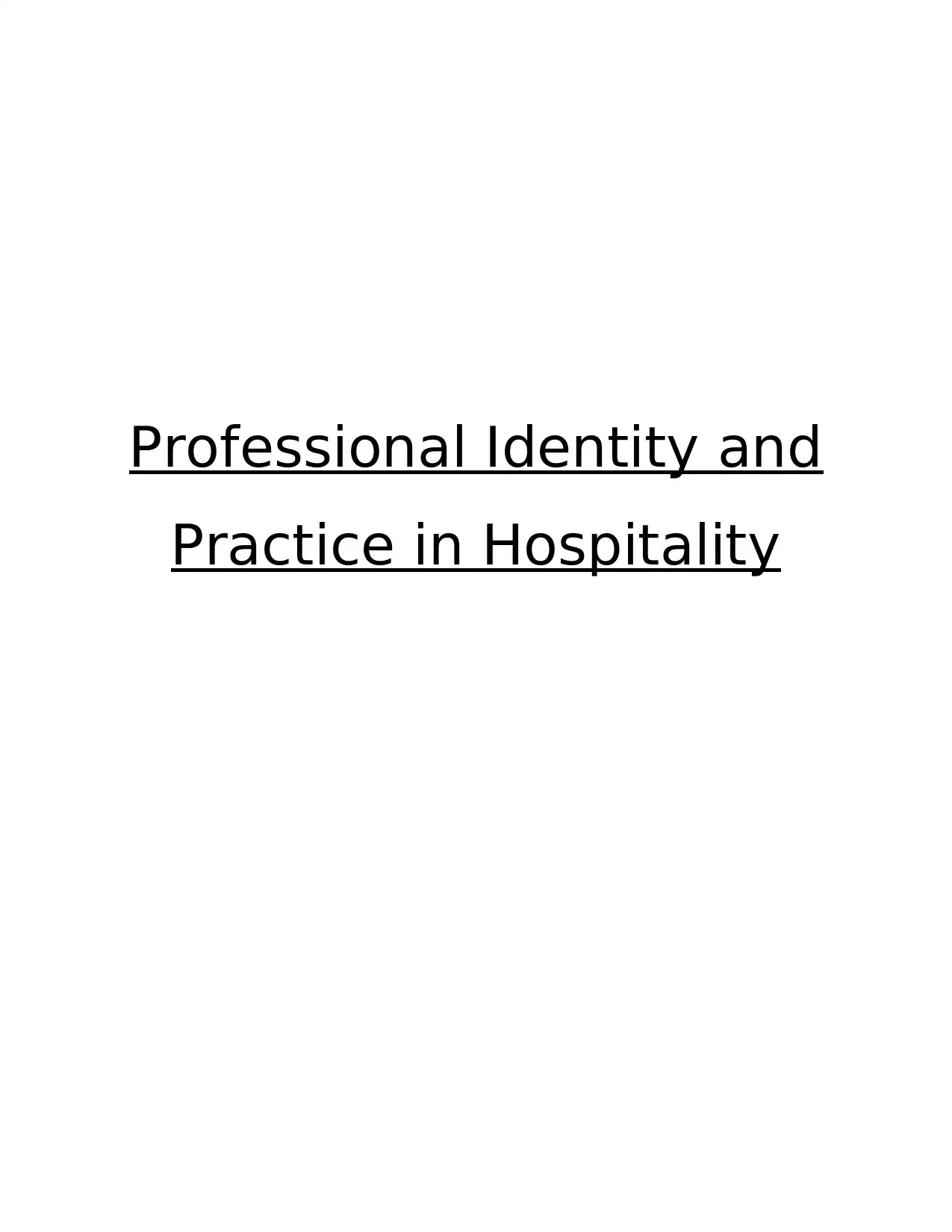
Professional Identity and
Practice in Hospitality
Practice in Hospitality
Paraphrase This Document
Need a fresh take? Get an instant paraphrase of this document with our AI Paraphraser
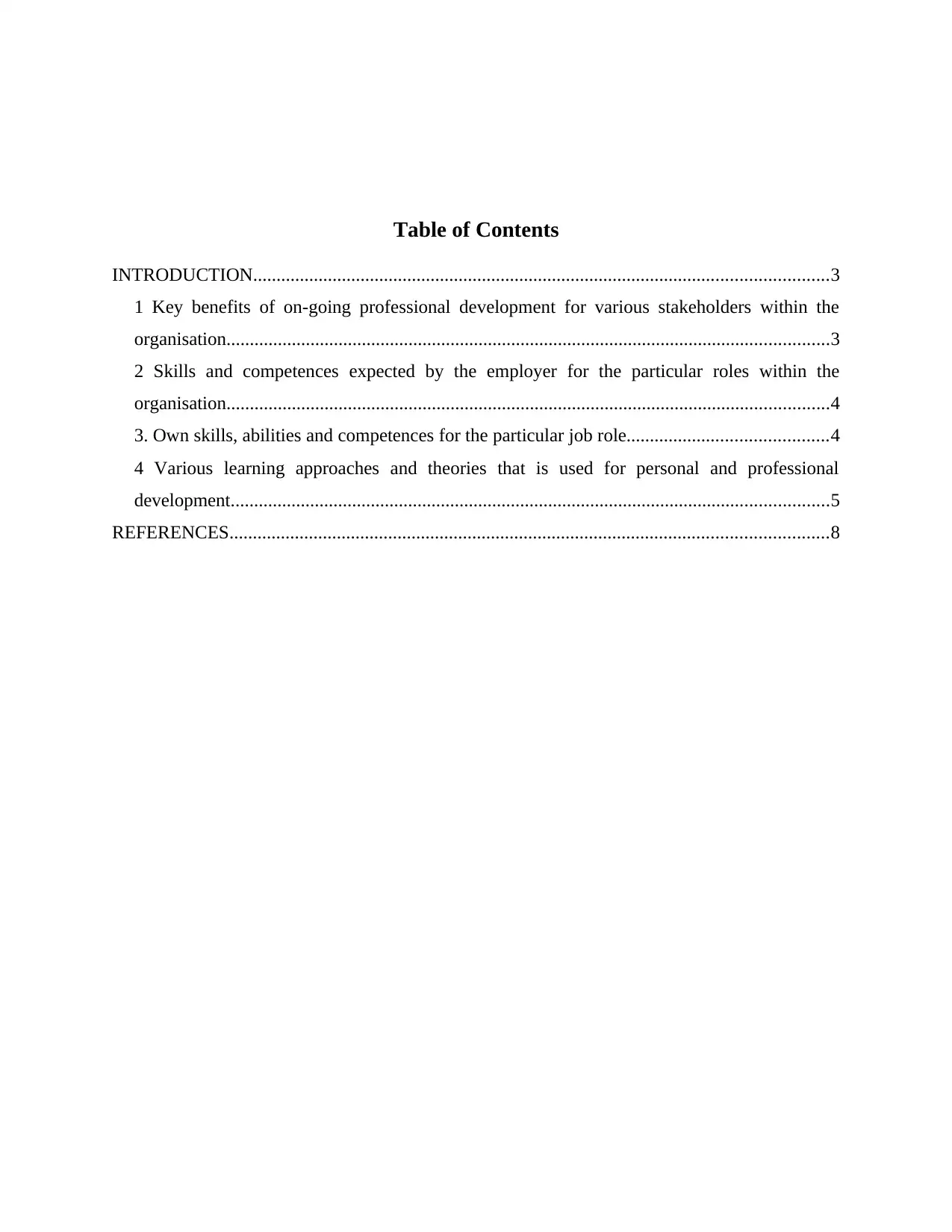
Table of Contents
INTRODUCTION...........................................................................................................................3
1 Key benefits of on-going professional development for various stakeholders within the
organisation.................................................................................................................................3
2 Skills and competences expected by the employer for the particular roles within the
organisation.................................................................................................................................4
3. Own skills, abilities and competences for the particular job role...........................................4
4 Various learning approaches and theories that is used for personal and professional
development................................................................................................................................5
REFERENCES................................................................................................................................8
INTRODUCTION...........................................................................................................................3
1 Key benefits of on-going professional development for various stakeholders within the
organisation.................................................................................................................................3
2 Skills and competences expected by the employer for the particular roles within the
organisation.................................................................................................................................4
3. Own skills, abilities and competences for the particular job role...........................................4
4 Various learning approaches and theories that is used for personal and professional
development................................................................................................................................5
REFERENCES................................................................................................................................8
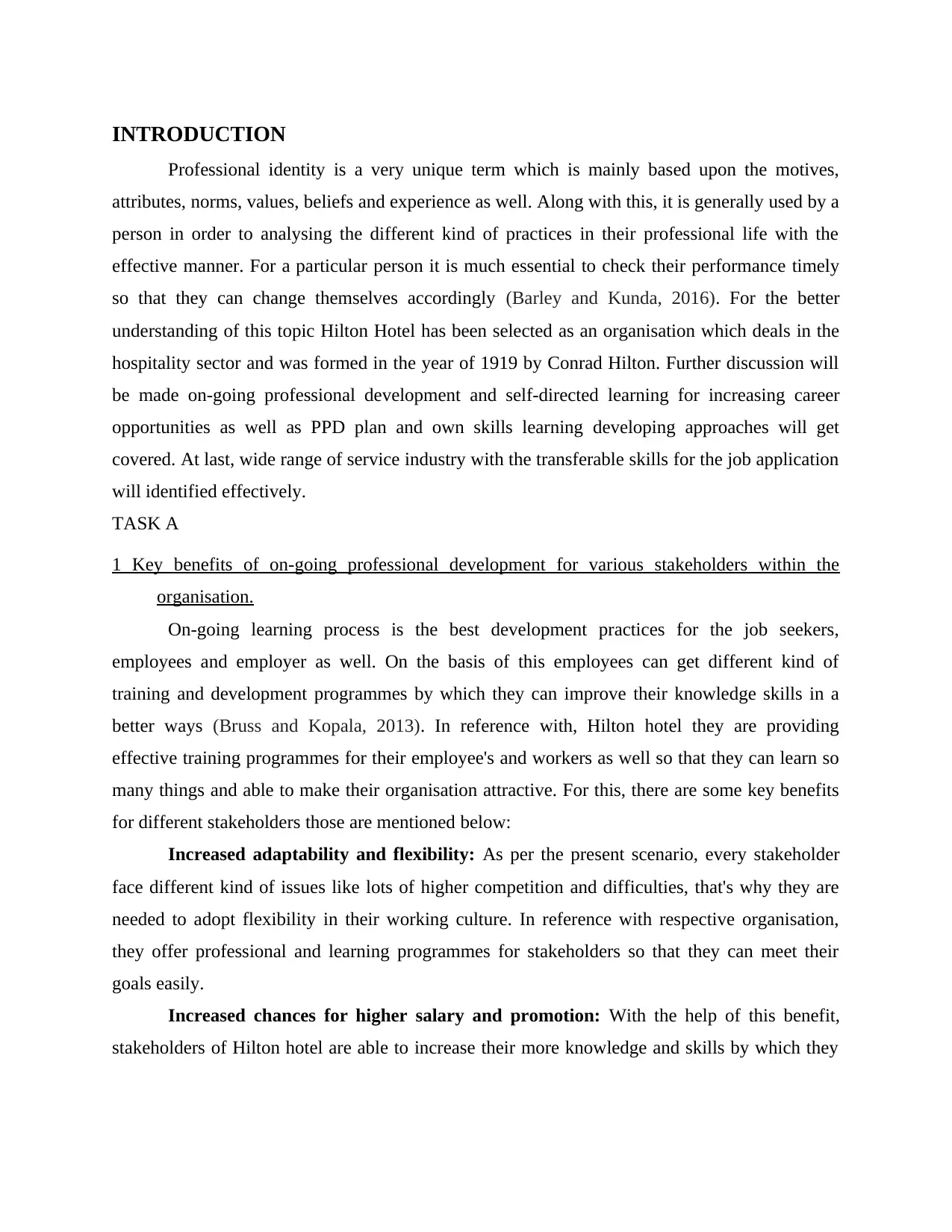
INTRODUCTION
Professional identity is a very unique term which is mainly based upon the motives,
attributes, norms, values, beliefs and experience as well. Along with this, it is generally used by a
person in order to analysing the different kind of practices in their professional life with the
effective manner. For a particular person it is much essential to check their performance timely
so that they can change themselves accordingly (Barley and Kunda, 2016). For the better
understanding of this topic Hilton Hotel has been selected as an organisation which deals in the
hospitality sector and was formed in the year of 1919 by Conrad Hilton. Further discussion will
be made on-going professional development and self-directed learning for increasing career
opportunities as well as PPD plan and own skills learning developing approaches will get
covered. At last, wide range of service industry with the transferable skills for the job application
will identified effectively.
TASK A
1 Key benefits of on-going professional development for various stakeholders within the
organisation.
On-going learning process is the best development practices for the job seekers,
employees and employer as well. On the basis of this employees can get different kind of
training and development programmes by which they can improve their knowledge skills in a
better ways (Bruss and Kopala, 2013). In reference with, Hilton hotel they are providing
effective training programmes for their employee's and workers as well so that they can learn so
many things and able to make their organisation attractive. For this, there are some key benefits
for different stakeholders those are mentioned below:
Increased adaptability and flexibility: As per the present scenario, every stakeholder
face different kind of issues like lots of higher competition and difficulties, that's why they are
needed to adopt flexibility in their working culture. In reference with respective organisation,
they offer professional and learning programmes for stakeholders so that they can meet their
goals easily.
Increased chances for higher salary and promotion: With the help of this benefit,
stakeholders of Hilton hotel are able to increase their more knowledge and skills by which they
Professional identity is a very unique term which is mainly based upon the motives,
attributes, norms, values, beliefs and experience as well. Along with this, it is generally used by a
person in order to analysing the different kind of practices in their professional life with the
effective manner. For a particular person it is much essential to check their performance timely
so that they can change themselves accordingly (Barley and Kunda, 2016). For the better
understanding of this topic Hilton Hotel has been selected as an organisation which deals in the
hospitality sector and was formed in the year of 1919 by Conrad Hilton. Further discussion will
be made on-going professional development and self-directed learning for increasing career
opportunities as well as PPD plan and own skills learning developing approaches will get
covered. At last, wide range of service industry with the transferable skills for the job application
will identified effectively.
TASK A
1 Key benefits of on-going professional development for various stakeholders within the
organisation.
On-going learning process is the best development practices for the job seekers,
employees and employer as well. On the basis of this employees can get different kind of
training and development programmes by which they can improve their knowledge skills in a
better ways (Bruss and Kopala, 2013). In reference with, Hilton hotel they are providing
effective training programmes for their employee's and workers as well so that they can learn so
many things and able to make their organisation attractive. For this, there are some key benefits
for different stakeholders those are mentioned below:
Increased adaptability and flexibility: As per the present scenario, every stakeholder
face different kind of issues like lots of higher competition and difficulties, that's why they are
needed to adopt flexibility in their working culture. In reference with respective organisation,
they offer professional and learning programmes for stakeholders so that they can meet their
goals easily.
Increased chances for higher salary and promotion: With the help of this benefit,
stakeholders of Hilton hotel are able to increase their more knowledge and skills by which they
⊘ This is a preview!⊘
Do you want full access?
Subscribe today to unlock all pages.

Trusted by 1+ million students worldwide
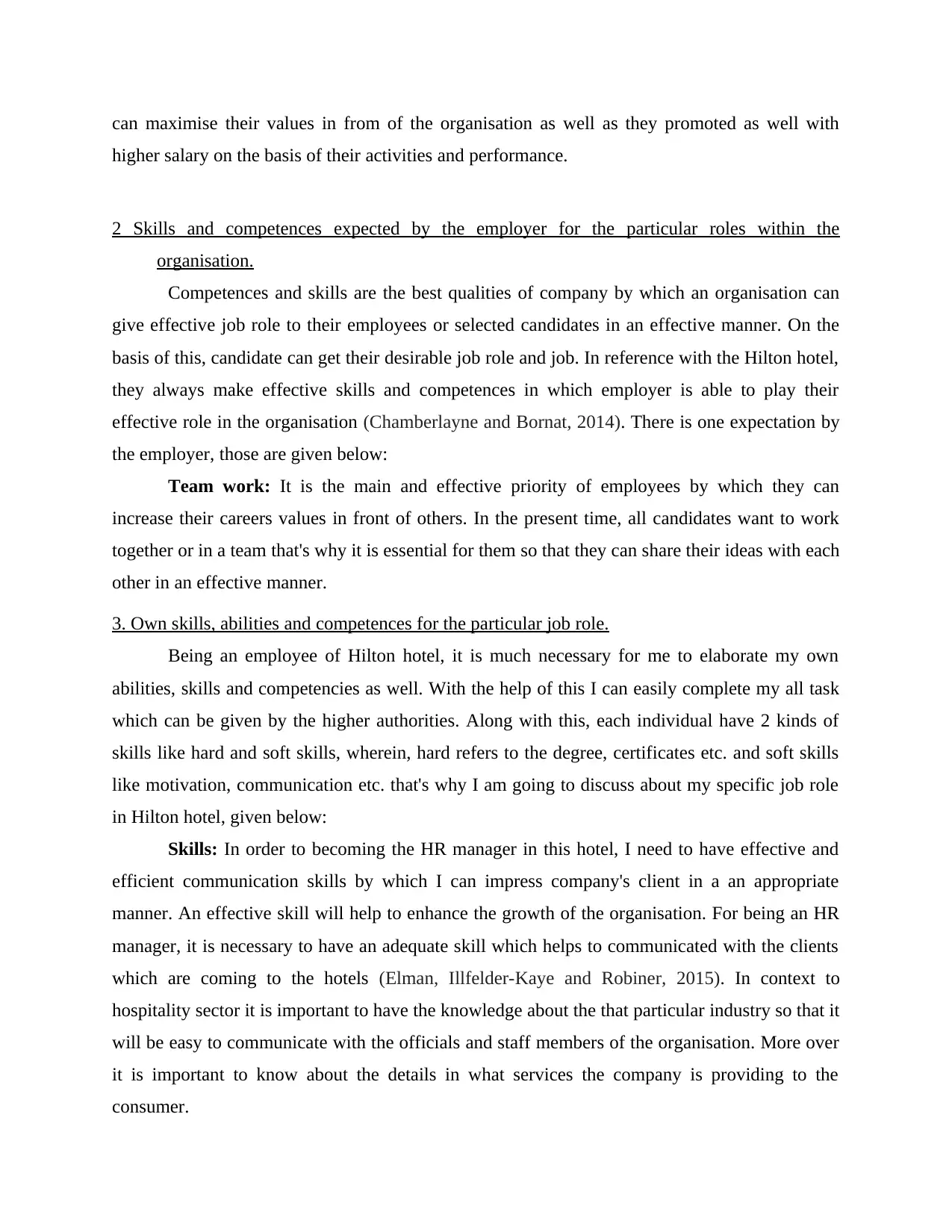
can maximise their values in from of the organisation as well as they promoted as well with
higher salary on the basis of their activities and performance.
2 Skills and competences expected by the employer for the particular roles within the
organisation.
Competences and skills are the best qualities of company by which an organisation can
give effective job role to their employees or selected candidates in an effective manner. On the
basis of this, candidate can get their desirable job role and job. In reference with the Hilton hotel,
they always make effective skills and competences in which employer is able to play their
effective role in the organisation (Chamberlayne and Bornat, 2014). There is one expectation by
the employer, those are given below:
Team work: It is the main and effective priority of employees by which they can
increase their careers values in front of others. In the present time, all candidates want to work
together or in a team that's why it is essential for them so that they can share their ideas with each
other in an effective manner.
3. Own skills, abilities and competences for the particular job role.
Being an employee of Hilton hotel, it is much necessary for me to elaborate my own
abilities, skills and competencies as well. With the help of this I can easily complete my all task
which can be given by the higher authorities. Along with this, each individual have 2 kinds of
skills like hard and soft skills, wherein, hard refers to the degree, certificates etc. and soft skills
like motivation, communication etc. that's why I am going to discuss about my specific job role
in Hilton hotel, given below:
Skills: In order to becoming the HR manager in this hotel, I need to have effective and
efficient communication skills by which I can impress company's client in a an appropriate
manner. An effective skill will help to enhance the growth of the organisation. For being an HR
manager, it is necessary to have an adequate skill which helps to communicated with the clients
which are coming to the hotels (Elman, Illfelder-Kaye and Robiner, 2015). In context to
hospitality sector it is important to have the knowledge about the that particular industry so that it
will be easy to communicate with the officials and staff members of the organisation. More over
it is important to know about the details in what services the company is providing to the
consumer.
higher salary on the basis of their activities and performance.
2 Skills and competences expected by the employer for the particular roles within the
organisation.
Competences and skills are the best qualities of company by which an organisation can
give effective job role to their employees or selected candidates in an effective manner. On the
basis of this, candidate can get their desirable job role and job. In reference with the Hilton hotel,
they always make effective skills and competences in which employer is able to play their
effective role in the organisation (Chamberlayne and Bornat, 2014). There is one expectation by
the employer, those are given below:
Team work: It is the main and effective priority of employees by which they can
increase their careers values in front of others. In the present time, all candidates want to work
together or in a team that's why it is essential for them so that they can share their ideas with each
other in an effective manner.
3. Own skills, abilities and competences for the particular job role.
Being an employee of Hilton hotel, it is much necessary for me to elaborate my own
abilities, skills and competencies as well. With the help of this I can easily complete my all task
which can be given by the higher authorities. Along with this, each individual have 2 kinds of
skills like hard and soft skills, wherein, hard refers to the degree, certificates etc. and soft skills
like motivation, communication etc. that's why I am going to discuss about my specific job role
in Hilton hotel, given below:
Skills: In order to becoming the HR manager in this hotel, I need to have effective and
efficient communication skills by which I can impress company's client in a an appropriate
manner. An effective skill will help to enhance the growth of the organisation. For being an HR
manager, it is necessary to have an adequate skill which helps to communicated with the clients
which are coming to the hotels (Elman, Illfelder-Kaye and Robiner, 2015). In context to
hospitality sector it is important to have the knowledge about the that particular industry so that it
will be easy to communicate with the officials and staff members of the organisation. More over
it is important to know about the details in what services the company is providing to the
consumer.
Paraphrase This Document
Need a fresh take? Get an instant paraphrase of this document with our AI Paraphraser
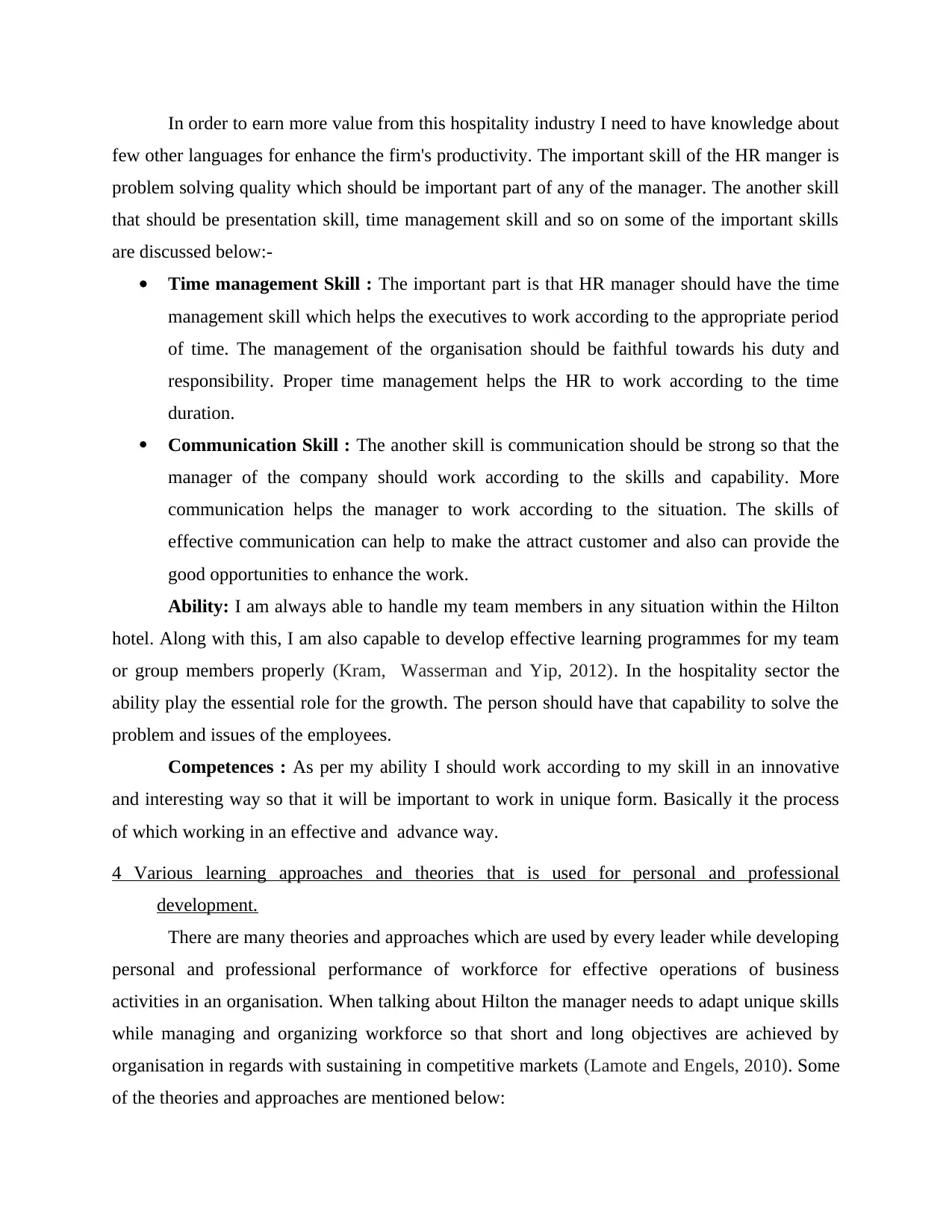
In order to earn more value from this hospitality industry I need to have knowledge about
few other languages for enhance the firm's productivity. The important skill of the HR manger is
problem solving quality which should be important part of any of the manager. The another skill
that should be presentation skill, time management skill and so on some of the important skills
are discussed below:-
Time management Skill : The important part is that HR manager should have the time
management skill which helps the executives to work according to the appropriate period
of time. The management of the organisation should be faithful towards his duty and
responsibility. Proper time management helps the HR to work according to the time
duration.
Communication Skill : The another skill is communication should be strong so that the
manager of the company should work according to the skills and capability. More
communication helps the manager to work according to the situation. The skills of
effective communication can help to make the attract customer and also can provide the
good opportunities to enhance the work.
Ability: I am always able to handle my team members in any situation within the Hilton
hotel. Along with this, I am also capable to develop effective learning programmes for my team
or group members properly (Kram, Wasserman and Yip, 2012). In the hospitality sector the
ability play the essential role for the growth. The person should have that capability to solve the
problem and issues of the employees.
Competences : As per my ability I should work according to my skill in an innovative
and interesting way so that it will be important to work in unique form. Basically it the process
of which working in an effective and advance way.
4 Various learning approaches and theories that is used for personal and professional
development.
There are many theories and approaches which are used by every leader while developing
personal and professional performance of workforce for effective operations of business
activities in an organisation. When talking about Hilton the manager needs to adapt unique skills
while managing and organizing workforce so that short and long objectives are achieved by
organisation in regards with sustaining in competitive markets (Lamote and Engels, 2010). Some
of the theories and approaches are mentioned below:
few other languages for enhance the firm's productivity. The important skill of the HR manger is
problem solving quality which should be important part of any of the manager. The another skill
that should be presentation skill, time management skill and so on some of the important skills
are discussed below:-
Time management Skill : The important part is that HR manager should have the time
management skill which helps the executives to work according to the appropriate period
of time. The management of the organisation should be faithful towards his duty and
responsibility. Proper time management helps the HR to work according to the time
duration.
Communication Skill : The another skill is communication should be strong so that the
manager of the company should work according to the skills and capability. More
communication helps the manager to work according to the situation. The skills of
effective communication can help to make the attract customer and also can provide the
good opportunities to enhance the work.
Ability: I am always able to handle my team members in any situation within the Hilton
hotel. Along with this, I am also capable to develop effective learning programmes for my team
or group members properly (Kram, Wasserman and Yip, 2012). In the hospitality sector the
ability play the essential role for the growth. The person should have that capability to solve the
problem and issues of the employees.
Competences : As per my ability I should work according to my skill in an innovative
and interesting way so that it will be important to work in unique form. Basically it the process
of which working in an effective and advance way.
4 Various learning approaches and theories that is used for personal and professional
development.
There are many theories and approaches which are used by every leader while developing
personal and professional performance of workforce for effective operations of business
activities in an organisation. When talking about Hilton the manager needs to adapt unique skills
while managing and organizing workforce so that short and long objectives are achieved by
organisation in regards with sustaining in competitive markets (Lamote and Engels, 2010). Some
of the theories and approaches are mentioned below:
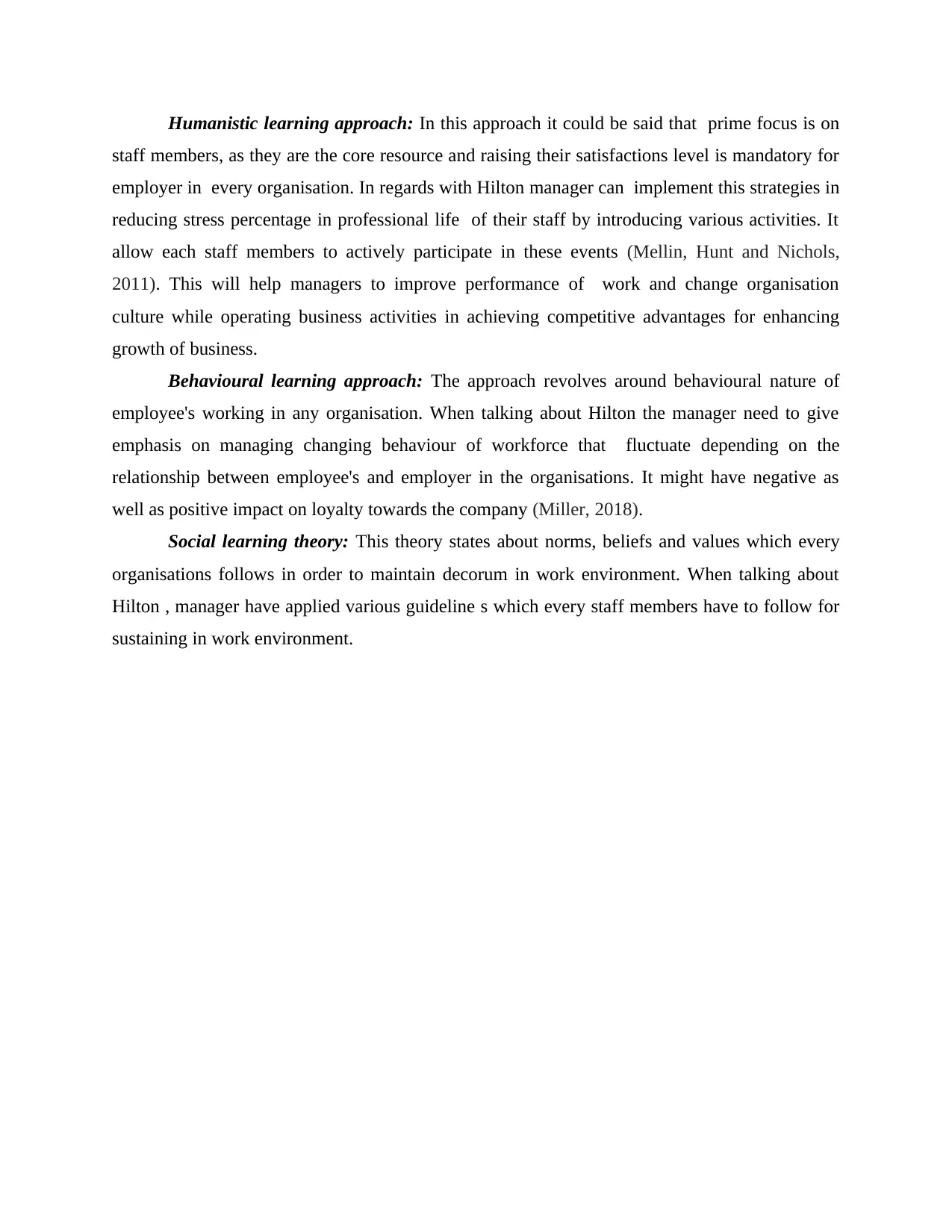
Humanistic learning approach: In this approach it could be said that prime focus is on
staff members, as they are the core resource and raising their satisfactions level is mandatory for
employer in every organisation. In regards with Hilton manager can implement this strategies in
reducing stress percentage in professional life of their staff by introducing various activities. It
allow each staff members to actively participate in these events (Mellin, Hunt and Nichols,
2011). This will help managers to improve performance of work and change organisation
culture while operating business activities in achieving competitive advantages for enhancing
growth of business.
Behavioural learning approach: The approach revolves around behavioural nature of
employee's working in any organisation. When talking about Hilton the manager need to give
emphasis on managing changing behaviour of workforce that fluctuate depending on the
relationship between employee's and employer in the organisations. It might have negative as
well as positive impact on loyalty towards the company (Miller, 2018).
Social learning theory: This theory states about norms, beliefs and values which every
organisations follows in order to maintain decorum in work environment. When talking about
Hilton , manager have applied various guideline s which every staff members have to follow for
sustaining in work environment.
staff members, as they are the core resource and raising their satisfactions level is mandatory for
employer in every organisation. In regards with Hilton manager can implement this strategies in
reducing stress percentage in professional life of their staff by introducing various activities. It
allow each staff members to actively participate in these events (Mellin, Hunt and Nichols,
2011). This will help managers to improve performance of work and change organisation
culture while operating business activities in achieving competitive advantages for enhancing
growth of business.
Behavioural learning approach: The approach revolves around behavioural nature of
employee's working in any organisation. When talking about Hilton the manager need to give
emphasis on managing changing behaviour of workforce that fluctuate depending on the
relationship between employee's and employer in the organisations. It might have negative as
well as positive impact on loyalty towards the company (Miller, 2018).
Social learning theory: This theory states about norms, beliefs and values which every
organisations follows in order to maintain decorum in work environment. When talking about
Hilton , manager have applied various guideline s which every staff members have to follow for
sustaining in work environment.
⊘ This is a preview!⊘
Do you want full access?
Subscribe today to unlock all pages.

Trusted by 1+ million students worldwide
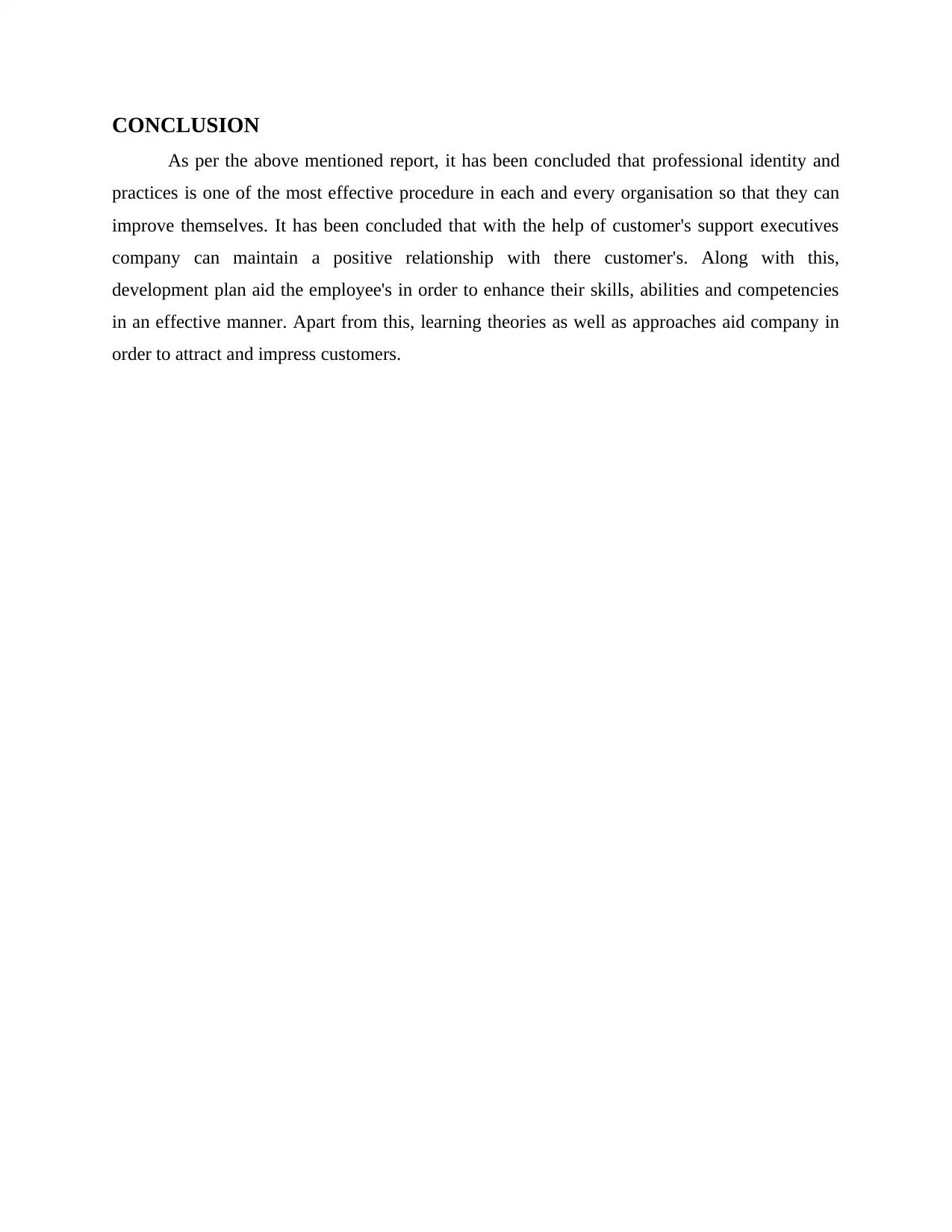
CONCLUSION
As per the above mentioned report, it has been concluded that professional identity and
practices is one of the most effective procedure in each and every organisation so that they can
improve themselves. It has been concluded that with the help of customer's support executives
company can maintain a positive relationship with there customer's. Along with this,
development plan aid the employee's in order to enhance their skills, abilities and competencies
in an effective manner. Apart from this, learning theories as well as approaches aid company in
order to attract and impress customers.
As per the above mentioned report, it has been concluded that professional identity and
practices is one of the most effective procedure in each and every organisation so that they can
improve themselves. It has been concluded that with the help of customer's support executives
company can maintain a positive relationship with there customer's. Along with this,
development plan aid the employee's in order to enhance their skills, abilities and competencies
in an effective manner. Apart from this, learning theories as well as approaches aid company in
order to attract and impress customers.
Paraphrase This Document
Need a fresh take? Get an instant paraphrase of this document with our AI Paraphraser
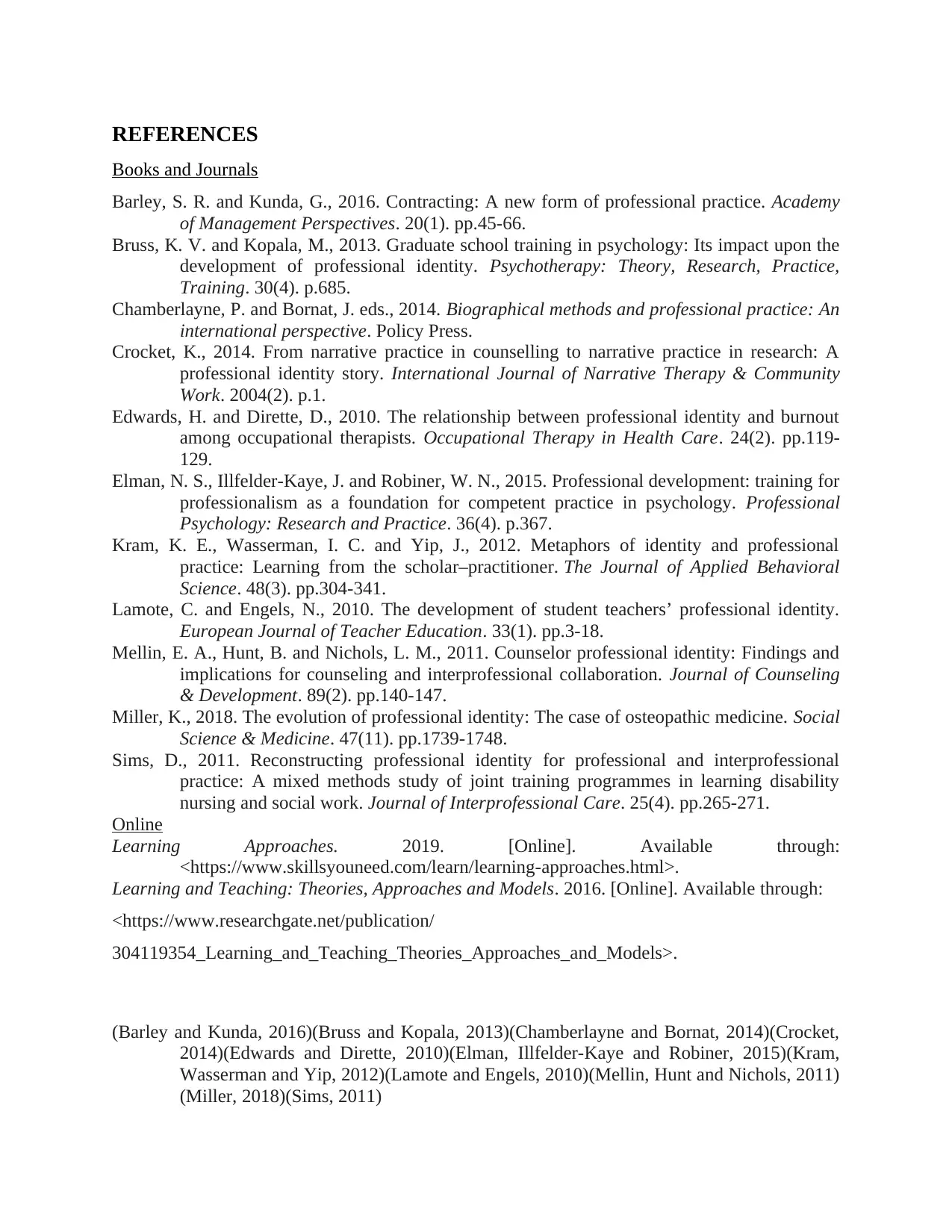
REFERENCES
Books and Journals
Barley, S. R. and Kunda, G., 2016. Contracting: A new form of professional practice. Academy
of Management Perspectives. 20(1). pp.45-66.
Bruss, K. V. and Kopala, M., 2013. Graduate school training in psychology: Its impact upon the
development of professional identity. Psychotherapy: Theory, Research, Practice,
Training. 30(4). p.685.
Chamberlayne, P. and Bornat, J. eds., 2014. Biographical methods and professional practice: An
international perspective. Policy Press.
Crocket, K., 2014. From narrative practice in counselling to narrative practice in research: A
professional identity story. International Journal of Narrative Therapy & Community
Work. 2004(2). p.1.
Edwards, H. and Dirette, D., 2010. The relationship between professional identity and burnout
among occupational therapists. Occupational Therapy in Health Care. 24(2). pp.119-
129.
Elman, N. S., Illfelder-Kaye, J. and Robiner, W. N., 2015. Professional development: training for
professionalism as a foundation for competent practice in psychology. Professional
Psychology: Research and Practice. 36(4). p.367.
Kram, K. E., Wasserman, I. C. and Yip, J., 2012. Metaphors of identity and professional
practice: Learning from the scholar–practitioner. The Journal of Applied Behavioral
Science. 48(3). pp.304-341.
Lamote, C. and Engels, N., 2010. The development of student teachers’ professional identity.
European Journal of Teacher Education. 33(1). pp.3-18.
Mellin, E. A., Hunt, B. and Nichols, L. M., 2011. Counselor professional identity: Findings and
implications for counseling and interprofessional collaboration. Journal of Counseling
& Development. 89(2). pp.140-147.
Miller, K., 2018. The evolution of professional identity: The case of osteopathic medicine. Social
Science & Medicine. 47(11). pp.1739-1748.
Sims, D., 2011. Reconstructing professional identity for professional and interprofessional
practice: A mixed methods study of joint training programmes in learning disability
nursing and social work. Journal of Interprofessional Care. 25(4). pp.265-271.
Online
Learning Approaches. 2019. [Online]. Available through:
<https://www.skillsyouneed.com/learn/learning-approaches.html>.
Learning and Teaching: Theories, Approaches and Models. 2016. [Online]. Available through:
<https://www.researchgate.net/publication/
304119354_Learning_and_Teaching_Theories_Approaches_and_Models>.
(Barley and Kunda, 2016)(Bruss and Kopala, 2013)(Chamberlayne and Bornat, 2014)(Crocket,
2014)(Edwards and Dirette, 2010)(Elman, Illfelder-Kaye and Robiner, 2015)(Kram,
Wasserman and Yip, 2012)(Lamote and Engels, 2010)(Mellin, Hunt and Nichols, 2011)
(Miller, 2018)(Sims, 2011)
Books and Journals
Barley, S. R. and Kunda, G., 2016. Contracting: A new form of professional practice. Academy
of Management Perspectives. 20(1). pp.45-66.
Bruss, K. V. and Kopala, M., 2013. Graduate school training in psychology: Its impact upon the
development of professional identity. Psychotherapy: Theory, Research, Practice,
Training. 30(4). p.685.
Chamberlayne, P. and Bornat, J. eds., 2014. Biographical methods and professional practice: An
international perspective. Policy Press.
Crocket, K., 2014. From narrative practice in counselling to narrative practice in research: A
professional identity story. International Journal of Narrative Therapy & Community
Work. 2004(2). p.1.
Edwards, H. and Dirette, D., 2010. The relationship between professional identity and burnout
among occupational therapists. Occupational Therapy in Health Care. 24(2). pp.119-
129.
Elman, N. S., Illfelder-Kaye, J. and Robiner, W. N., 2015. Professional development: training for
professionalism as a foundation for competent practice in psychology. Professional
Psychology: Research and Practice. 36(4). p.367.
Kram, K. E., Wasserman, I. C. and Yip, J., 2012. Metaphors of identity and professional
practice: Learning from the scholar–practitioner. The Journal of Applied Behavioral
Science. 48(3). pp.304-341.
Lamote, C. and Engels, N., 2010. The development of student teachers’ professional identity.
European Journal of Teacher Education. 33(1). pp.3-18.
Mellin, E. A., Hunt, B. and Nichols, L. M., 2011. Counselor professional identity: Findings and
implications for counseling and interprofessional collaboration. Journal of Counseling
& Development. 89(2). pp.140-147.
Miller, K., 2018. The evolution of professional identity: The case of osteopathic medicine. Social
Science & Medicine. 47(11). pp.1739-1748.
Sims, D., 2011. Reconstructing professional identity for professional and interprofessional
practice: A mixed methods study of joint training programmes in learning disability
nursing and social work. Journal of Interprofessional Care. 25(4). pp.265-271.
Online
Learning Approaches. 2019. [Online]. Available through:
<https://www.skillsyouneed.com/learn/learning-approaches.html>.
Learning and Teaching: Theories, Approaches and Models. 2016. [Online]. Available through:
<https://www.researchgate.net/publication/
304119354_Learning_and_Teaching_Theories_Approaches_and_Models>.
(Barley and Kunda, 2016)(Bruss and Kopala, 2013)(Chamberlayne and Bornat, 2014)(Crocket,
2014)(Edwards and Dirette, 2010)(Elman, Illfelder-Kaye and Robiner, 2015)(Kram,
Wasserman and Yip, 2012)(Lamote and Engels, 2010)(Mellin, Hunt and Nichols, 2011)
(Miller, 2018)(Sims, 2011)

⊘ This is a preview!⊘
Do you want full access?
Subscribe today to unlock all pages.

Trusted by 1+ million students worldwide

Paraphrase This Document
Need a fresh take? Get an instant paraphrase of this document with our AI Paraphraser


⊘ This is a preview!⊘
Do you want full access?
Subscribe today to unlock all pages.

Trusted by 1+ million students worldwide
1 out of 13
Related Documents
Your All-in-One AI-Powered Toolkit for Academic Success.
+13062052269
info@desklib.com
Available 24*7 on WhatsApp / Email
![[object Object]](/_next/static/media/star-bottom.7253800d.svg)
Unlock your academic potential
Copyright © 2020–2026 A2Z Services. All Rights Reserved. Developed and managed by ZUCOL.





